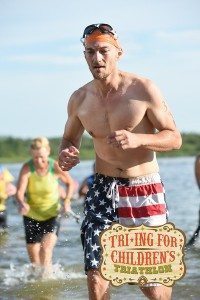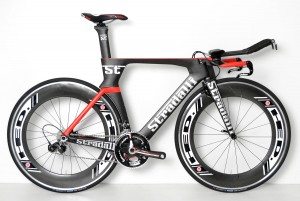A Few Tips to Try When Trying your First Triathlon
(See what I did with the title there? That’s called alliteration. #TheMoreYouKnow)
So there you are, sitting on your couch eyeing up your prey. The scent of your quarry wafts lightly on a breeze to your well trained nose, leaving you with heightened anticipation. Your expert senses pick up all atmospheric variations that could affect your shot. You note the direction of the wind on your cheek created by the oscillating fan, and slightly adjust your position to account for the breeze.

You’ve spotted a beautiful specimen; it’s a half gallon of Ben & Jerry’s Cherry Garcia. Oh, she’s a beaut alright. You raise your trusty frozen dairy spearing device (AKA: spoon), and take aim. But just as you’re going in for the kill shot on that delightful confectionary concoction, you make an error in judgement; you breathe in. And when you breathe in, your belly expands.
Alerted to your presence by the movement, your prey takes flight. Cursing yourself for making such an amateur mistake, you try to move rapidly; attempting to ensnare your target before it can get away. In a desperate last ditch effort, you dive after it, but you’re too late. It tumbles from atop your bloated belly and flees, rolling across the floor. You lay there on the floor still, watching in disappointment as your elusive prey makes its escape; leaving behind it only a sticky trail and broken dreams. And in that moment of quiet reflection, you have an epiphany. You need to get back in shape.
Making the Decision
Whether you are an athlete at the top of your respective sport looking for a new challenge, or more fitting of the situation described above, the decision to enter a triathlon is a big one. There are many different paths to fitness to consider, and none of them are bad, except maybe this one (I won’t apologize for that, I found it by googling worst sport ever. WTH Gloucestershire? Invest in a foosball table or something).
So why choose to get into triathlons over another sport? Well, if you’re like me it’s because you’re looking for an extreme challenge and you like variety. In fact, those were the two most commonly cited reasons people had for choosing triathlons when I asked around at the event.
But both of those can also be reasons not to start with this sport. If you’re looking for a casual workout, triathlons are probably not what you’re looking for. Developing the conditioning for one sport is hard enough if you’re not used to it. Trying to develop the strength and endurance for three separate sports is challenging and requires a lot of dedication.
In addition to that, you have to pay to get into three separate sports. This means potentially buying not only running shoes and swim caps, but you’re going to need a specialized bike to be competitive with special bike shoes and pedals. This can all add up very quickly. On the flip side, it will get you in killer shape, and you will live with the pride of knowing that you have accomplished something that only a very small percent of the population has.
Sound interesting? If so, read on for a few tips from another newbie triathlete on how not to embarrass yourself on the day of the race.
Tip #1: Train to fight, fight to win

For anyone who hasn’t heard this phrase (or never stopped to think about what it means), I’ll spell it out for you. Train to the standard that you are going to be tested at. If you’re in the military, that means that you need to train for real combat if you want to survive real combat. For triathlons, that means train for race conditions or you’re going to embarrass yourself.
Personally, I failed horribly at this one (which is why most of these tips will be selected). As I did not have very readily available lake access and was doing most of my training before the sun came up, I did all of my swim training in a pool. I can’t put into words how much that set me up for failure. When it came time for race day, I ran into the water thinking that this might be my strongest event. I left the water praying it was my weakest.
Fun fact: if you’re only accustomed to lifting your mouth ½ inch out of the water to take a breath, and there are waves that are even 1.5 inches tall, you’re drowning! And you won’t even understand why! Also, goggles don’t let you see underwater in a lake that several hundred other people are swimming in. So if you’re competing in a lake, train in a lake. If you’re biking on hills, train on hills. I cannot possibly stress the importance of this enough.
Pictured: Something that costs more than I probably make in a year. It’s pretty dang fast though.
Tip #2: You can’t out-train bad equipment

I’m not saying that you can’t finish the race with a mountain bike; I’m just saying that unless you’re riding on trails, you’re not going to win. Many of the competitors will have specialized TT bikes (time trial bikes), that can cost many thousands of dollars. They’ve probably also been competing for quite a while. My personal recommendation? Just get yourself a decent used roadbike if you don’t already have one, and don’t plan on coming in first. You may decide that you don’t want to do another race after your first, so do you really want to spend 5-15K on a new TT bike?
The flip side of this is that you do have to accept that the people who have spent the
cash on those bikes will be faster than you. There’s a reason that they can charge so much for those things. However, for an extra $100-300, you can trick out your road bike to be much more competitive. (That’s a hyperlink. You click on it.)
Tip #3: Other people have done it before you. Listen to them. Let them be your Obi Wan.
There are dozens of training schedules online for how to get ready for your first tri. They are mostly written by people who have done dozens of races, received training on how to decrease their time, and have probably trained other people. Listen to them. When I planned this article before my race, I had intended for it to be a training schedule to get ready for a race. After learning some serious humility on race day (I came out of the water from the swim in dead last for my heat), I decided that I could do more good by just informing people how not to embarrass themselves in the same ways I did.
Tip #4: Get out there and do it.
If you’re hoping to be competitive at all on race day, do you think it should be the first time that you’ve done a full distance triathlon? This was my one saving grace on race day; many people train their butts off in all kinds of different ways, without actually getting out and doing a full triathlon on their own. I signed up for the Olympic distance race, so that’s what I trained for. By race day, I had done about a dozen full distance tri’s on my own (in addition to my other training).
I may have been an idiot and trained in a pool for my swim, and only had a $50 70’s era road bike off of Craigslist, but I finished strong. I came out of the water disoriented and confused, but not tired. I passed some of the people on their spiffy TT bikes during the pedal portion, because I wasn’t worn out yet. And I managed to pass another 36 people on the run (clearly my strongest event). I certainly didn’t finish first, but I did come in at a fairly respectable position; and that was because I had trained for the distance.
Regardless of what position you finish in, or if you even bother competing, triathlons are a great sport to get into. So, since your half gallon of Ben and Jerry’s has probably melted all over the floor while you were reading this, why not get up and go give it a tri? (Haha, get it? See what I did there? Ugh, never mind. It’s not funny if I have to explain it.) But clean up your ice cream mess first. That’s how you get ants.
